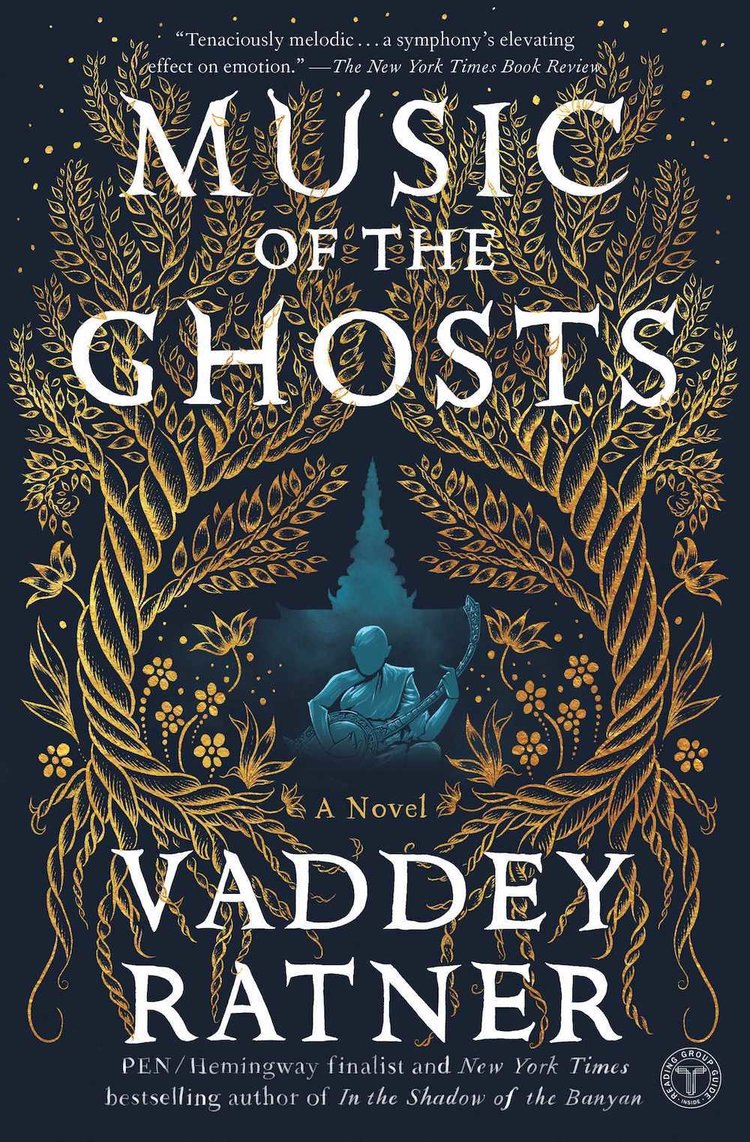

Vaddey Ratner
NYT Bestselling Novelist
Cambodian American Writer


Readings &
Lecture Topics
- Bravery In Art and Politics
- Art & Resilience
- Human Rights and the Responsibility of Global Citizenship
- An Evening with Vaddey Ratner
Biography
“As the great human drama unfurls in this sensitive and impassioned telling, it is impossible not to be moved…Ratner is a fearless writer.” —The Guardian
“Humanity shines through in her storytelling.” –Wall Street Journal
Vaddey Ratner, a survivor of the Khmer Rouge genocide and war refugee, is a Cambodian American novelist. She is the author of two critically-acclaimed novels. In the Shadow of the Banyan (2013), Ratner’s debut autobiographical New York Times bestseller, was a finalist for both the PEN/Hemingway Award and the Indies Choice Book of the Year and was selected for the National Endowment for the Arts Big Read program. Music of the Ghosts (2017), Ratner’s second novel, was a New York Times Book Review Editor’s Choice and long-listed for the Aspen Words Literary Prize. Her works have been translated into twenty languages.
Ratner was five years old when the Khmer Rouge came to power in 1975. After four years, having endured forced labor, starvation, and near execution, she and her mother escaped while many of her family members perished. In 1981, she arrived in rural Missouri as a refugee not knowing English, and later, living in the low-income Torre de San Miguel housing project in Saint Paul, Minnesota, graduated as her 1990 high school class valedictorian. She is a summa cum laude graduate of Cornell University, where she specialized in Southeast Asian history and literature.
Ratner is a descendant of King Sisowath, who ruled Cambodia in the early part of the twentieth century. In 1970, her father’s first cousin, Prince Sisowath Sirik Matak, led the coup that ended monarchal reign to establish a short-lived republic, soon engulfed in the chaos of the broader Vietnam War. Once the Khmer Rouge took power, forcing the entire urban population into agrarian work camps, the royal name that once meant protection and comfort now marked them for death.
Based on her childhood experience, In the Shadow of the Banyan is a story about the unbreakable bonds of family, and the power of stories to transcend loss and suffering. “First and foremost,” says Ratner, “I wanted to honor the lives lost and those who made monumental sacrifices to save me. And I wanted to do so through art…to draw to the foreground an experience I feel we all share as human beings—our hunger for life, our desire to live even in the face of death.”
The result is an unforgettable celebration of innocence and the transcendent power of imagination, a work Little Bee author Chris Cleave calls “one of the most extraordinary acts of storytelling I have ever encountered…utterly heartbreaking and impossibly beautiful.” The novel appears on eight lists of the best books of 2012, including citations from The Christian Science Monitor and Kirkus Reviews. The Washington Post calls it “a tale of perseverance, hope and the drive toward life…piercing, lyrical.”
Ratner’s Music of the Ghosts explores the legacy of genocide and the journey toward atonement and forgiveness. “Tenaciously melodic…a symphony’s elevating effect on emotion,” writes the New York Times Book Review. “Ratner stirs feeling—sorrow, sympathy, pleasure—through language so ethereal in the face of dislocation and loss…Music of the Ghosts has been fashioned by a writer scarred by war, a writer whose ability to discern the poetic even in brutal landscapes and histories may be the gift that helped her reassemble the fragments of a self and a life after such shattering suffering.”
Ratner has appeared on NPR’s Morning Edition, and her life and work have been profiled in USA Today and The Washington Post. She has spoken to diverse audiences including the PEN/Faulkner Foundation annual gala on the theme of art and resilience, the United Nations Association on human rights and the responsibility of global citizenship, and the PEN World Voices Festival of International Literature on the theme of bravery in art and politics.
Ratner lives with her husband and daughter outside of Washington, DC in Potomac, Maryland, and divides her time between the US and Southeast Asia.
Short Bio
Vaddey Ratner, a survivor of the Khmer Rouge genocide and war refugee, is a Cambodian American novelist. She is the author of two critically-acclaimed novels. Ratner’s debut autobiographical New York Times bestseller, In the Shadow of the Banyan, was a finalist for both the PEN/Hemingway Award and the Indies Choice Book of the Year and was selected for the National Endowment for the Arts Big Read program. Her second novel, Music of the Ghosts, was a New York Times Book Review Editor’s Choice and longlisted for the Aspen Words Literary Prize. Her works have been translated into twenty languages. Ratner was five years old when the Khmer Rouge came to power in 1975. After four years, having endured forced labor, starvation, and near execution, she and her mother escaped while many of her family members perished. In 1981, she arrived in rural Missouri as a refugee not knowing English, and later, living in the low-income Torre de San Miguel housing project in Saint Paul, Minnesota, graduated as her 1990 high school class valedictorian. She is a summa cum laude graduate of Cornell University, where she specialized in Southeast Asian history and literature. Ratner lives with her husband and daughter outside of Washington, DC in Potomac, Maryland, and divides her time between the US and Southeast Asia.
Visit Author WebsiteVideos
Publications
Music of the Ghosts
2017
“Music of the Ghosts has been fashioned by a writer scarred by war, a writer whose ability to discern the poetic even in brutal landscapes and histories may be the gift that helped her reassemble the fragments of a self and a life after such shattering suffering.” —The New York Times
Music of The Ghosts chronicles the story of a young woman who returns to her homeland after receiving a letter from a mysterious man who claims to have known her father before he disappeared in the Cambodian holocaust. Teera, a thirty-seven-year-old American, returns to Cambodia for the first time after her harrowing escape as a child refugee more than two decades earlier. She carries back with her the ashes of her recently deceased aunt and a letter from a stranger who claims he knew her father in Slak Daek, the notorious Pol Pot security prison where her father disappeared. When she arrives, Teera finds a country of survivors, where perpetrators and victims of recent atrocities are finding a way to live side by side. She reacquaints herself with places that ignite long-buried memories, meets a young doctor who begins to open her heart to a new Cambodia, and prepares herself to learn her father’s fate from the author of the letter, known as the Old Musician. Now a half-blind elderly man who earns his keep by playing music at a temple, the Old Musician waits for Teera’s visit, anticipating the confession he must make. He remembers his love for her mother, his admiration for her father, and the passion with which they all embraced the Khmer Rouge’s promise of a democratic society, embarking on a journey that ended in the horror chamber only he survived. Together Teera and the Old Musician confront the truth of their intertwined past, weaving a redemptive melody that will leave both transformed, and freeing Teera to find a new home and a new love in the places she least expects.
In the Shadow of the Banyan
2013
“Gracefully rendered…rich with history, language and emotion. A novel that will surely be read and valued by future generations.” —PEN/Hemingway Award Finalist citation
For seven-year-old Raami, the shattering end of childhood begins with the footsteps of her father returning home in the early dawn hours, bringing details of the civil war that has overwhelmed the streets of Phnom Penh, Cambodia’s capital. Soon the family’s world of carefully guarded royal privilege is swept up in the chaos of revolution and forced exodus. Over the next four years, as the Khmer Rouge attempts to strip the population of every shred of individual identity, Raami clings to the only remaining vestige of her childhood—the mythical legends and poems told to her by her father. In a climate of systematic violence where memory is sickness and justification for execution, Raami fights for her improbable survival. Displaying the author’s extraordinary gift for language, In the Shadow of the Banyan is a brilliantly wrought tale of human resilience.
Articles & Audio
Read What’s In Print
• Profile of Vaddey Ratner: Out of the Shadow —The Washington Post
• Interview with Vaddey Ratner – Book Magnet
Listen to Audio
• Interview with Vaddey Ratner: “In the Shadow of Death, Stories Survive” — NPR
Selected Writings
• Read “Letter from Cambodia” by Vaddey Ratner – THINK Magazine
• “My City: Phnom Penh Crossroads” by Vaddey Ratner – National Geographic Traveler
• Read “The Cripple’s Last Dance” by Vaddey Ratner – Guernica
